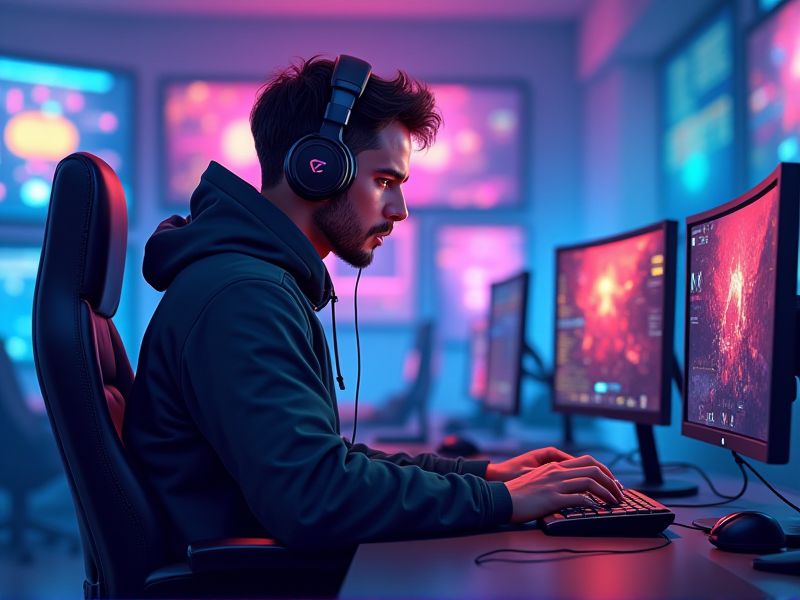
While there isn't a direct quote from a famous person on how to improve at Overwatch 2, a key strategy involves **timing and role diversity**. Players should focus on understanding when to switch heroes based on the enemy team's composition and utilize communication effectively to coordinate team efforts. Additionally, **learning the basics of each hero** and understanding their counters can significantly enhance gameplay, as it allows for better team synergy and strategic decision-making during matches. By mastering these elements, players can improve their overall performance and climb the ranks in Overwatch 2.
How to Be Better at Overwatch 2
Enhance communication.
Precise and timely communication significantly improves coordination among teammates in Overwatch 2, ultimately leading to better strategic moves. Clear callouts during gameplay allow team members to react to evolving situations and capitalize on enemy mistakes, creating a positive feedback loop. Using voice chat or effective text commands can prevent confusion and ensure everyone is aligned on objectives. Regular practice in communicating essential information, such as enemy locations and ultimate statuses, results in a noticeable boost in overall performance.
Develop map awareness.
Enhancing map awareness equips you with key insights into enemy positions and potential flanking routes, which in turn sharpens your decision-making during critical in-game moments. Recognizing spawn points and environmental cues allows you to predict enemy movements and adjust your positioning accordingly, leading to fewer surprises in engagements. By integrating real-time data on team placements and enemy ultimates with the evolving map layout, you can better anticipate conflicts and secure advantageous positions. Fostering a habit of scanning the map continuously creates a situational feedback loop that strengthens coordination and minimizes risk.
Optimize hero role synergy.
Selecting heroes that complement one another while filling gaps in the team's composition often leads to stronger in-game performance. Coordinated communication allows teams to combine abilities effectively, such as linking crowd control with high burst damage to secure rounds. Tactical use of ultimates can create game-changing moments when executed in synergy with teammates' skills. Analyzing performance data and win rates for different hero pairings can guide informed choices that improve overall team synergy.
Improve positioning.
Effective positioning starts with understanding each map's layout so you can identify key high-ground areas and natural chokepoints that force opponents into predictable paths. Anticipating enemy movement lets you position yourself to capitalize on their errors while minimizing your exposure to incoming fire. Continuously analyzing your gameplay data helps highlight when you're in optimal spots and when you need to reposition during fast-paced engagements. Incorporating lessons from pro players and regularly reviewing match recordings can provide practical insights to fine-tune your positioning tactics.
Master ability timing.
Focusing on ability cooldowns in custom games reinforces your understanding of each hero's optimal activation times. Mastering ability timing directly improves your impact in battles, as using skills at the right moment can shift the momentum in your favor. This precision is key because it turns otherwise wasted abilities into game-changing moves that can secure kills or counter enemy strategies. Analyzing and refining your timing through gameplay replays further enhances your decision-making, ensuring you capitalize on every opportunity to support your team.
Refine mechanical skills.
Refining mechanical skills in Overwatch 2 begins with a structured training regimen that incorporates both aim training maps and custom games to apply real-world pressure and precision. Regular analysis of your in-game data reveals specific weaknesses in reaction times and targeting, creating a direct causal link between focused practice and improvement. Experimenting with different sensitivity settings and practicing flick shots can directly enhance your ability to track fast-moving targets in competitive scenarios. Integrating these targeted drills with periodic reviews of your performance data establishes a feedback loop that continuously sharpens your mechanical skills and overall gameplay effectiveness.
Adapt strategies.
Develop a deep understanding of each hero's strengths so you can pivot whenever the enemy changes tactics. Consistently monitor the match flow and adjust your positioning, hero selection, or role to counter emerging threats. Communicate essential information with your team during gameplay to keep everyone aligned on necessary strategy shifts. Study enemy patterns and use that data to preemptively modify your approach, ensuring higher success rates in competitive matches.
Emphasize teamwork.
Effective teamwork starts with clear, constant communication that ensures every player understands the tactical plan. Coordinated strategies allow teammates to capitalize on their unique abilities, often leading to decisive moments against opponents. Mutual support during critical junctures minimizes errors and creates openings for objectives or defensive plays. Prioritizing collaboration leads to improved game sense and sustained victories in Overwatch 2.
Specialize in hero mastery.
Specializing in hero mastery sharpens your understanding of in-game mechanics, allowing you to leverage unique abilities and strategies effectively. Focusing on a limited hero roster enables a thorough analysis of each hero's strengths and weaknesses, which directly improves your decision-making under pressure. This deep familiarity with chosen heroes leads to refined positioning and ultimate usage, making your performances consistently impactful. Emphasizing data-driven practice sessions and reviewing professional gameplay accelerates skill growth and adaptation, ultimately yielding higher win rates.
Engage in continuous practice.
Continuous practice builds muscle memory and sharpens your reaction time, which is critical in high-pressure scenarios. Repeating key maneuvers and diverse tactics across different heroes enables you to adapt to evolving team dynamics and enemy strategies. Regular practice sessions also allow you to analyze your in-game decisions and identify areas for improvement through data-driven feedback. This disciplined approach results in a tangible improvement in overall gameplay, making you a more effective and versatile player in Overwatch 2.
Summary
Enhanced communication is essential as it promotes quick, clear decision-making and tactical adjustments during critical moments in the game. Developing map awareness allows players to predict enemy movements and seize opportunities, effectively turning positional advantages into game-winning strategies. Optimizing hero role synergy ensures that individual character strengths are maximized, creating a unified force that adapts fluidly to evolving battle conditions. Emphasizing these elements collectively transforms gameplay efficiency, driving overall team performance to new heights in Overwatch 2.
